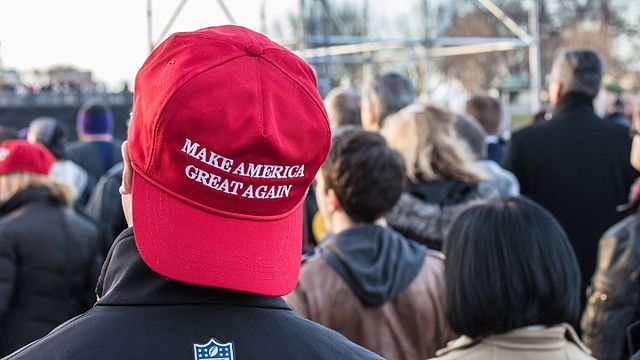Building empathy and understanding in the age of Trump

Growing up in Portland, xenophobia, racism, and bigotry felt more conceptual than real to me. But while Portland is famous for being a left-leaning city, the Obama-Biden bumper stickers, commercial marijuana dispensaries, and pride flags galore aren’t a reflection of Oregon at large. Like New York, Chicago, Philadelphia, and a host of other cities around the country, Portland is a lonely blue district in a sea of red. For years, I remained blissfully unaware of the anger and resentment that plagued a significant portion of the American electorate.
I remained ignorant, that is, until last November.
On election night, I attended a gathering hosted by the Oregon Democrats. The mood throughout the evening deteriorated from celebratory to anxious, to fearful, to finally, and worst of all, utterly dejected acceptance of our country’s support of the frightening man who would be our next president. How, I wondered that night, could we have been so wrong? Like millions of people around the country, I was shocked, disoriented, and completely, utterly confused.
Now, almost a year later, I understand that much of this confusion boiled down to just how insulated I had been. How insulated all who were surprised by the election were. While I was growing up in Portland, sticking pride flag stickers on my laptop and chuckling at Obama’s jokes on The Colbert Report, somebody just like me in Wyoming (or Idaho, Kansas, or Alabama) was furious with and full of resentment towards our federal government. I never knew that person—or rather, so many people—existed. And neither did millions of people in liberal enclaves around the country. By failing to truly understand the American electorate, and in doing so refusing to listen to the voices of a discontent white working class with more power than any of us thought, liberal America dug its own grave.
So how can we be less insulated? There isn’t a simple answer to this question, but it’s clear that in order to truly understand and recognize each other, we must want to understand and recognize each other. It’s critical that those protesting this administration try to break our liberal bubbles and make a point of empathizing with those who think differently than we do. While some supporters of the alt-right are white nationalists, and truly condemnable, there is a distinction between those voters and those who may have voted for other reasons—misinformation, economic anxiety, and frustration with the Democratic party among them.
Finding ways to empathize with the other side is particularly important on college campuses across the country. College students, like residents of large urban centers, tend to exist in liberal bubbles. For the most part, we’re surrounded by people who think the same way we do about contentious political issues, which makes it easy to tune out conservatives. Rather than silencing people with opposing viewpoints, though, we need to listen to what they have to say, then be prepared to debate and discuss each issue. We need to force ourselves to confront views that diametrically oppose our own, and think critically about why people believe the things they do.
Actions like disinviting controversial speakers to campus, for example, do not help bridge this disconnect. Over the last few years, a host of elite institutions—like Brown University, Williams College, and the University of Chicago—have rescinded invitations for high-profile, contentious speakers associated with the political right. Social and political commentator Ann Coulter, former Secretary of State Condoleezza Rice, and journalist Milo Yiannopoulos have all been disinvited from on-campus speaking events due to the threat of liberal student protests.
By so intensely regulating the speakers allowed to come to campus, by curating what we hear, we cultivate just the kind of liberal echo chambers that aided and abetted Donald Trump’s election to the highest political office in the United States and only further drive the disconnect between the left and right. It is crucial to acknowledge and confront people who don’t think like we do, believe what we believe, and might even dislike us based on an immutable part of our identities. Silencing conservative voices won’t make them go away.
Of course, this isn’t to say that campuses should allow any and all speakers to visit, or that individuals should interact with every and any person who holds opposing views. Public figures who regularly espouse truly hateful, bigoted rhetoric and individuals who align with white nationalist beliefs should not be amplified at all. But we must recognize that these are not the profiles of all people who identify as conservative, and campuses should promote the idea that students should engage in dialogue and critical thinking before confronting views that diametrically opposing their own.
Ultimately, student activists must challenge themselves to have hard conversations—whether in a public forum, a classroom, or a dorm room. We don’t need to come to any kind of universal consensus or even fully change each other’s ways of thinking, but we do need to hear each other out with open minds, compassion, and empathy.
More articles by Category: Politics
More articles by Tag: Alt-Right, College



























